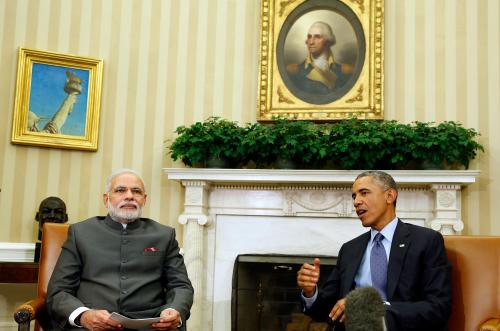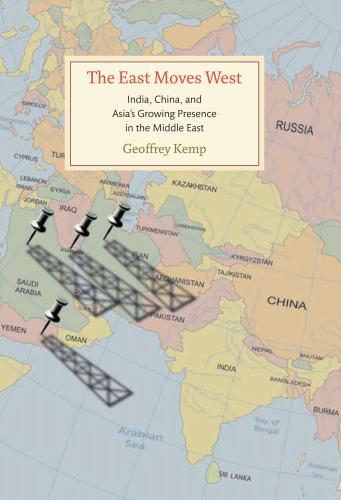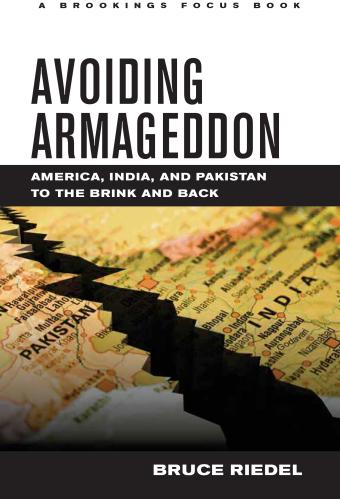Content from the Brookings Institution India Center is now archived. After seven years of an impactful partnership, as of September 11, 2020, Brookings India is now the Centre for Social and Economic Progress, an independent public policy institution based in India.
The chapter is part of a briefing book ‘India and Africa: Forging A Strategic Partnership’ edited by Dr. Subir Gokarn, Dr. WPS Sidhu and Shruti Godbole.
Africa and India have a long history of economic ties. For centuries, Indian traders sailed to Africa to trade manufactured goods for natural resources including: gold and gemstones. Resources are perhaps even critical to this relationship today and a new renaissance in this trading relationship is emerging, fuelled by India’s growing energy needs and large untapped hydrocarbon resources in Africa.
India currently imports eighty five percent of its oil and is emerging as a major LNG importer as well. According to the International Energy Agency’s estimates, India’s oil demand is likely to surpass Japan this quarter. As India’s population continues to rise and become wealthier energy consumption levels are predicted to double over the next two decades and many forecast that these may eventually surpass China’s demand levels.
This is good news for Africa. For established hydrocarbon producers in West and North Africa, India is emerging as an important market as shale induced oversupply disrupts flows to North America. Further, there have been significant new oil & gas discoveries in Ghana, Tanzania, Mozambique, Uganda and Kenya, India will be a key destination market for these resources too.
Notwithstanding the recent discoveries and t he long hist ory of oil & gas development in certain parts of Africa, the continent remains underexplored. According to the U.S Geological Survey, nearly 300 billion barrels of oil equivalent of oil, gas and natural gas liquids are yet to be discovered. Recent discoveries highlight potential of using modern technologies: for example, exploration success rates of over 75% have been achieved onshore Kenya and offshore Mozambique.
Uncertain times in oil & gas…
Unfortunately, with the recent downturn in oil prices the international oil and gas industry is unable to unlock the resource potential in Africa. Oil prices have more than halved since the highs of over $110 per barrel (Brent) in June last year. Rising unconventional production particularly in the US and weak oil demand have diluted OPEC’s pricing power. At the same time , increased volatility has made it difficult for companies to plan for the long term. In these turbulent times, access to capital has been dramatically curtailed. According to Wood Mackenzie, $220 billion in investment has been cut so far this year. In such a market, large and complex projects in Africa are particularly at risk of being delayed or cancelled.
From the perspective of resource rich countries in Africa, lower commodity prices have led to lower government revenues and the reduced pace of economic activity has also impacted local employment and delayed income. While many see the current low oil price environment as a major boom for consuming countries, the sharp cutback in investment is likely to translate into lower production capacity potentially leading to supply constraints in the future. For consumer countries this risks increasing the cyclicality and volatility in energy prices. For a major hydrocarbon consumer like India, it is therefore important to facilitate and support continued investment in oil & gas development, particularly in Africa.
Opportunities for Indian companies …
These uncertain times require creative solutions and Indian companies have a unique set of skills and experiences to “step into the breach” and offer a unique and comprehensive value proposition for contributing to the development of the hydrocarbon resources of Africa:
- Companies with experience in India are well versed in working in multi-cultural and multi ethnic environments, not dissimilar to those in many parts of Africa with a rich mix of ethnic, linguistic, religious and tribal
- Success in India requires the ability to deliver low cost projects, often leveraging local labour and building supply chains to maximise local India has had a very successful experience in developing strong local companies, creating local employment and ensuring a broad based economic development. A lot of this has been organic and evolutionary and linked it to capacity building programmes. This experience of companies in India will be relevant, as host nations in Africa look to help their people participate in the economic success of resource development.
- India is now an established engineering and technology hub for the international oil & gas sector. Many multinational companies have based their technology centres in India and this provides unmatched access to technology and
- As one of the few (perhaps only) large and growing consumer of oil & gas outside of the growing African continent, India can potentially provide market linkages to put in place long term off take arrangements for oil & gas developments in Africa. Such long term con tracts can help secure financing for upstream development s and related infrastructure. Also, the Indian banking sector is now quite sophisticated and has expertise in oil & gas financing and could play an important role in African projects with Indian off take arrangements.
What can host nations in Africa do…
The timely development of hydrocarbon resources is a key driver for value creation for host nations. Host governments typically share in value after the fields are developed, production starts and costs are recovered. For large scale resources, the value impact on host governments can be significant. A recent study by IHS energy highlighted that nearly 75% of oil fields discovered over the past decade are not producing. Many of these are in Africa. Typical impediments to development include policy road blocks, lack of infrastructure and critically – high costs. So the “above ground” environment can also be a major factor impacting the timely development of hydrocarbon resources.
While part of the costs for developing any re source are driven by the nature of the resource and its location, host governments often have a greater ability to impact project economics more than they may realize. For instance, implementation of policy reforms to facilitate fast track development of resources could not only improve the project economics but also lead to a significant increase in the host government’s value from the project.
Another “cont rollable cost” factor relates to supply chain costs. Experience has shown that customs delays, poor road infrastructure and port congestion can increase the costs of onshore exploration wells by over three times. These high costs not only deter investment, but in the case of a successful development they impair the host government’s share of value. Tactical investment by the host nation in essential infrastructure (roads, ports and power supply) and streamlining the international trade of goods and services will therefore not only make the projects more economically viable, but also unlock a lot of value for the nation. A proactive approach to identify such “controllable cost s” and to develop solutions to mitigate these will position Africa as a very competitive destination for capital in these uncertain times. The ability to finance major hydrocarbon developments and related infrastructure, depends ultimately on a certain and stable policy framework. Clarity and certainty around the laws, and stability backed by consistent policy action help reinforce investors’ confidence the ground rules will not change. From an investor’s perspective therefore, this is the most critical “ask” for any project or investment. Particularly at times like this, host governments in Africa should create an investment environment, through laws, contractual undertakings and behaviour, where the rules of the game are known, and not subject to any change on a unilateral basis.
In conclusion…
There are many positive developments in Africa and India’s energy engagement. African crude exports to India have increased significantly, from 22 million tonnes in 2004-05 to over 35 million tons in 2010-11. In recent years, Indian oil firms have also bought into exploration projects in Mozambique, Nigeria, Gabon and South Africa.
However, there is a historic opportunity to do a lot more. Building on long historic ties and a common approach to social and economic development, Indian companies can leverage their unique skill sets to support delivery of world class technology and low cost projects in Africa.
Several African countries have placed considerable focus on the critical support infrastructure needed; however heavily increasing external debt and a falling currency may create challenges for both financing and public funding, particularly in this current environment. Therefore a constructive partnership and financing approach becomes an important consideration to ensure urgently needed infrastructure and supply chain needs are not delayed. As a major and growing commodity consumer, India can also provide market linkages to deliver commercial viability, with long-term sales contracts to help underpin financing required.
At the same time, with a clear understanding of the current market environment and the competitive landscape, African countries can develop a proactive policy framework to make Africa the most attractive investment destination for resources.
Volatility and uncertainty are likely to persist and the oil & gas industry is in a “new paradigm” of conserving capital. However, it is important to recognize that this does not have to impede India and Africa’s engagement in hydrocarbon resources. In fact, a “resource bridge across the Indian Ocean” can be the foundation of a stronger economic relationship between India and Africa.






